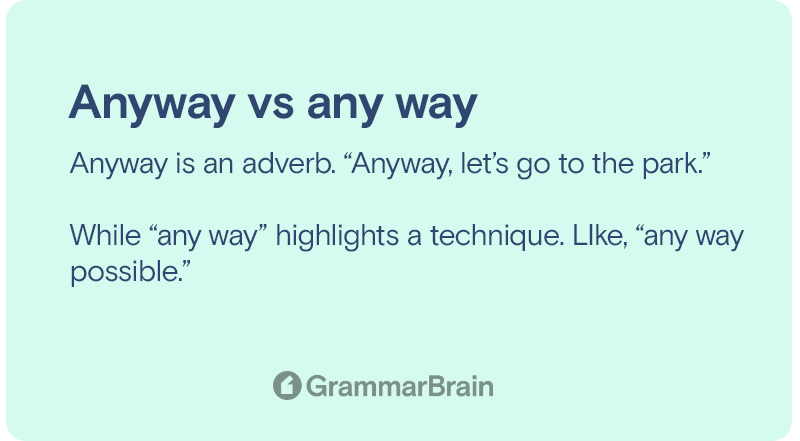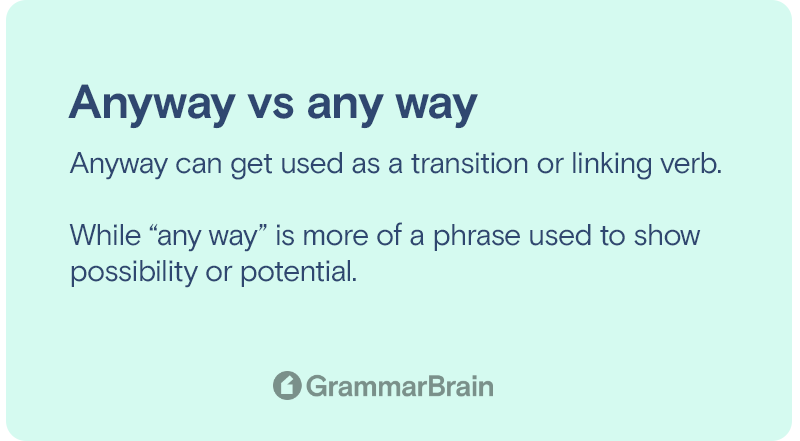Is it anyway or any way? Many people think that “anyway” and “any way” are similar words. though the meanings of both of these words are similar, they are used to express different things. To know more about the use of these words. Let’s see the difference between “anyway” vs “any way.”

Meaning of “Anyway”
The adverb “anyway” is used to show support for a position even though there are good reasons not to. It’s possible that someone will give counsel to a buddy even when they are aware that it can make them uncomfortable.
Meaning of “Any Way”
The two-word phrase “any way” cannot be used in place of the adverb. Any way, though, does show up as two words in some phrases.

When to Use Anyway:
Anyway is an adverb and not a sentence when used in any way. That alone links it to particular uses. Adverbs modify other words, such as adjectives, verbs, and even other adverbs. And contrary to what you may have heard in elementary school, not all adverbs must finish in -ly.
It might be compared to the words regardless, nonetheless, and however. You can use such terms as a clever approach to check your usage. When in doubt, try one of these terms to check if the statement still makes sense and flows.
Anyway Examples in a Sentence:
It is none of her business, anyway.
Anyway, I don’t drive too badly.
Anyway, I was making the point that all the things I’m doing at work are required of women.
Anyway, I was making an effort to keep things under control.
Anyway, she wants me to advise you to follow your gut.
Any denial would be exposed as a falsehood right away, anyway.
I should definitely organize things around here today, anyway.
Anyway, I believe you lack the funds to pay the bill.
Anyway, nobody needed to be aware of it.
Anyway, we’ll be able to enjoy breakfast together for the rest of our lives after today.
This weekend is predicted to bring a change in the weather anyway.
That, anyway, helps me feel better about a portion of it.
When to Use Any Way:
Any way highlights any technique and approach to accomplish a task or explain something. It consists of the noun route and the adjective any. It can be expanded upon, altered, and changed to meet the desired meaning.
Any Way Examples in a Sentence:
- Parents frequently use any way bribes to convince their kids to eat broccoli.
- Is there any way for you to call me later?
- Is there any way than using the interstate to get there?
- Teachers frequently use any way at their disposal to encourage kids to read.
Anyway vs Any Way: What Is The Difference?
“Any way” and “anyway” are entirely different words, even though there is just a short space separating them. Remember that anyway should always prevail in the discussion between anyway and anyways.
It is important to remember how each one is used to effectively employ any way vs. anyway. In contrast to anyway, which is merely an adverb, “any way” is a phrase having two elements of speech.
FAQs
How do you use any way?
Anyway is a transitional adverb that conveys agreement or support and is frequently used to switch subjects. “Any way” is a noun phrase that denotes whatever undetermined approach or method will be practical.
Is it right to say anyway?
The adverb “anyway” means whatever. Simply put, “anyway” is correct without an “S.” Use it without the “S” at all times. The word “anyways” with the S is slang and belongs to informal, colloquial speech or nonstandard English.
What are the other words for anyway?
The words you can use instead of anyway are:
- In any case.
- Anyhow.
- In any event.
- At any rate.
- However.
Can I start a sentence with anyway?
As the preposition “anyway” typically denotes the beginning of a narrative thread. Additionally, it is used to indicate “in any circumstance” at the ends of clauses and sentences: He wasn’t really attractive, to begin with.
Is “anyway” in the family of compound words?
Yes. Anyway combines both the single word “any” and “way” to create the two-word version.
Is “anyways” a word?
No, “anyway” as an adverb can not get pluralized. Hence why it’s not common to see the word “anyways” in formal writing.
Inside this article
Fact checked:
Content is rigorously reviewed by a team of qualified and experienced fact checkers. Fact checkers review articles for factual accuracy, relevance, and timeliness. Learn more.
Core lessons
Glossary
- Abstract Noun
- Accusative Case
- Anecdote
- Antonym
- Active Sentence
- Adverb
- Adjective
- Allegory
- Alliteration
- Adjective Clause
- Adjective Phrase
- Ampersand
- Anastrophe
- Adverbial Clause
- Appositive Phrase
- Clause
- Compound Adjective
- Complex Sentence
- Compound Words
- Compound Predicate
- Common Noun
- Comparative Adjective
- Comparative and Superlative
- Compound Noun
- Compound Subject
- Compound Sentence
- Copular Verb
- Collective Noun
- Colloquialism
- Conciseness
- Consonance
- Conditional
- Concrete Noun
- Conjunction
- Conjugation
- Conditional Sentence
- Comma Splice
- Correlative Conjunction
- Coordinating Conjunction
- Coordinate Adjective
- Cumulative Adjective
- Dative Case
- Determiner
- Declarative Sentence
- Declarative Statement
- Direct Object Pronoun
- Direct Object
- Diction
- Diphthong
- Dangling Modifier
- Demonstrative Pronoun
- Demonstrative Adjective
- Direct Characterization
- Definite Article
- Doublespeak
- False Dilemma Fallacy
- Future Perfect Progressive
- Future Simple
- Future Perfect Continuous
- Future Perfect
- First Conditional
- Irregular Adjective
- Irregular Verb
- Imperative Sentence
- Indefinite Article
- Intransitive Verb
- Introductory Phrase
- Indefinite Pronoun
- Indirect Characterization
- Interrogative Sentence
- Intensive Pronoun
- Inanimate Object
- Indefinite Tense
- Infinitive Phrase
- Interjection
- Intensifier
- Infinitive
- Indicative Mood
- Participle
- Parallelism
- Prepositional Phrase
- Past Simple Tense
- Past Continuous Tense
- Past Perfect Tense
- Past Progressive Tense
- Present Simple Tense
- Present Perfect Tense
- Personal Pronoun
- Personification
- Persuasive Writing
- Parallel Structure
- Phrasal Verb
- Predicate Adjective
- Predicate Nominative
- Phonetic Language
- Plural Noun
- Punctuation
- Punctuation Marks
- Preposition
- Preposition of Place
- Parts of Speech
- Possessive Adjective
- Possessive Determiner
- Possessive Case
- Possessive Noun
- Proper Adjective
- Proper Noun
- Present Participle
- Prefix
- Predicate



